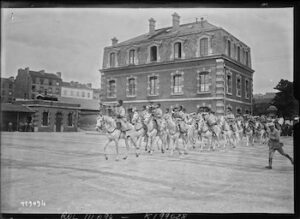
The Black Guard
*The Black Guard is affirmed on this date in 1699. They were the corps of Black African slaves and slave soldiers assembled by the 'Alawi sultan of Morocco, Isma'il ibn Sharif.
Isma'il ruled for 55 years between 1672 and 1727, one of the longest reigns in Moroccan history. He distinguished himself as a ruler who wished for a unified Moroccan state in contrast to previous dynasties, which relied on certain tribes or regions as their power base. He succeeded partly by creating a new army of slaves loyal to him alone. In 1699, he gave orders to enslave all Black Africans in Morocco, even those who were born free or who were Muslim, and, consequently, he violated two of the central tenets of Islamic law concerning slavery. Moroccan registers show that Isma'il enslaved over 221,000 Black Moroccans between 1699 and 1705.
In a study of these events, scholar Chouki El Hamel argues that Isma'il's efforts to justify these actions generated a potent new form of racist discourse in the region that associated black Africans with slavery. The idea of a professional army composed of slaves loyal only to the sultan was inspired by the historical precedents of other Middle Eastern and North African military bodies recruited from slaves. Isma'il's army was like the Janissaries in the Ottoman Empire. The Black Guard mainly collected taxes and patrolled Morocco's unstable countryside; they crushed rebellions against Isma'il's rule not only by dissident tribes but also by Isma'il's seditious sons, who defected from service as his provincial governors to insurrection as would-be usurpers of his throne.
The Black Guard were the personal guards and servants of Sultan Isma'il; they might have also participated in campaigns against the European-controlled fortress enclaves dotting his empire's coast (such as Tangier, taken over after the English withdrew from it and distressed it in 1684 in response). However, tasks of this kind were often allocated to European slaves and loyal Moroccan tribal soldiers, who were considered more military. They were well-respected, well-paid, and politically influential. Around 1697-1698, they could possess property. This military corps, loyal only to the sultan, was one of the pillars of his power as he sought to establish absolute authority over Morocco.
After Isma'il's death, the Black Guard became one of the most potent factions in Moroccan politics during the following turmoil. Over the later 18th century and the 19th century, their role in the military was reduced, and their political status varied between privilege and marginalization. Their descendants eventually regained their freedom and resettled across the country. While Black Africans lived in the region long before Isma'il's reign, a long-term consequence of his policies was the introduction and eventual dispersal of a substantial new Black population in Morocco.
Over time, most of the former 'Abid and their descendants had left the army and gained their freedom. They scattered and resettled across the country. Some Blacks and families continued to hold influential positions in the Moroccan government. The most notable example is Ahmad ibn Musa, whose family monopolized the office of the sultans in the 19th century. Ba Ahmed acted as de facto ruler of Morocco during the first four years of the reign, whom he helped install on the throne.
The trans-Saharan slave trade continued throughout the 19th century, even in the face of European abolitionist pressure, but by 1900 it had been significantly reduced. Slavery was officially abolished in Morocco in 1912, at the beginning of French colonial rule. Some descendants of the 'Abid continued to serve in various positions in the government afterward.